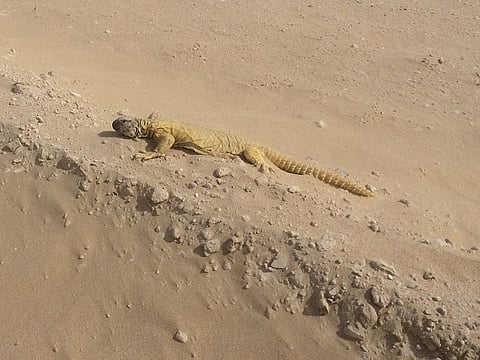‘Little dinosaur’ at Expo 2020 Dubai site?
The spiny-tailed lizard was spotted and relocated to protect the species

Dubai: A prehistoric-looking reptile dubbed ‘little dinosaur’ that caused quite a stir at the Expo 2020 site in Dubai recently was safely captured and released back into the wild.
Locally known in Arabic as dhub, the spiny-tailed lizard was spotted just before the Eid holidays near the Expo 2020 Dubai site where the East Car Park is being constructed.
The reptile naturally occurs in the Arabian Peninsula but its population is decreasing due to threats to its habitat. The IUCN Red List classifies the reptile as vulnerable.
“Our teams and workers on site spotted the spiny-tailed lizard, which is also nicknamed ‘little dinosaur’. The team’s on-site [staff] are very well aware of the procedures to take just in case they spot any kind of fauna inside which has happened previously as well,” Ayesha Al Marzooqi, Assistant Manager — Sustainability and Innovation, Expo 2020 Dubai, told Gulf News during its Environment Week that took place from June 9 to 13.
“As soon as they spotted this species, they contacted the environmental team at Expo 2020, which in turn contacted Dubai Municipality to arrange for the relocation of this spiny-tailed lizard.”
Al Marzooqi said the team managed to capture the lizard safely and as soon as officials from Dubai Municipality arrived on-site. They handed over the lizard to be relocated to a safer place.
“It was released on the same day to a location with a similar environment and nature to the Expo site, which was not very far so the lizard could adapt to its relatively new home,” Al Marzooqi said.
Relocating flora and fauna found at the Expo 2020 site is crucial as sustainability is one of the themes of the Expo 2020.
An Arabian sand boa snake, Eryx jayakari, was also recently found at the 4.38-square-kilometre site and relocated. An array of animals, including foxes, gazelles and hares, have all been relocated during Expo’s construction, while mature ghaf trees have also been preserved in their locations at the site.
In November, a colony of Apis mellifera bees was discovered at the Sustainability Pavilion plot. The colony is now thriving at Sustainability City.
“It’s very important that we preserve the species in the UAE. Biodiversity is one of the key aspects of sustainability that we look into and we would want to highlight through our platform in Expo 2020,” Al Marzooqui said.
Scientific Name: Uromastyx aegyptia microlepis
Common name: spiny-tailed lizard
Habitat: rocky areas (inland cliffs, mountain peaks, shrub land, desert,
Distribution: microlepsis: deserts and semi-deserts of Arabia: UAE, Saudi Arabia, Yemen, Qatar, Kuwait, Jordan, Syria, Iraq, coastal Iran
Size: One of the largest species of the genus with a total length of up to 76cm
Source: IUCN Red List, The Reptile Database



